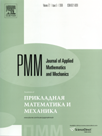 | | Journal of Applied
Mathematics and Mechanics
Russian Academy of Sciences | | Founded
in January 1936
(Translated from 1958)
Issued 6 times a year
ISSN 0021-8928
(print version) |
Archive of Issues
| Total articles in the database: | | 10610 |
| In Russian (ΟΜΜ): | | 9811
|
| In English (J. Appl. Math. Mech.): | | 799 |
|
| << Previous article | Volume 77, Issue 1 / 2013 | Next article >> |
| I.G. Brykina, B.V. Rogov, G.A. Tirskiy, V.A. Titarev, and S.V. Utyuzhnikov, "A comparative analysis of approaches for investigating hypersonic flow over blunt bodies in a transitional regime," J. Appl. Math. Mech. 77 (1), 9-16 (2013) |
| Year |
2013 |
Volume |
77 |
Issue |
1 |
Pages |
9-16 |
| Title |
A comparative analysis of approaches for investigating hypersonic flow over blunt bodies in a transitional regime |
| Author(s) |
I.G. Brykina (Moscow, Russia, shantii@mail.ru)
B.V. Rogov (Moscow, Russia)
G.A. Tirskiy (Moscow, Russia)
V.A. Titarev (Moscow, Russia)
S.V. Utyuzhnikov (Moscow, Russia) |
| Abstract |
Hypersonic flows of a viscous perfect rarefied gas over blunt bodies in a transitional flow regime from continuum to free molecular, characteristic when spacecraft re-enter Earth's atmosphere at altitudes above 90-100 km, are considered. The two-dimensional problem of hypersonic flow is investigated over a wide range of free stream Knudsen numbers using both continuum and kinetic approaches: by numerical and analytical solutions of the continuum equations, by numerical solution of the Boltzmann kinetic equation with a model collision integral in the form of the S-model, and also by the direct simulation Monte Carlo method. The continuum approach is based on the use of asymptotically correct models of a thin viscous shock layer and a viscous shock layer. A refinement of the condition for a temperature jump on the body surface is proposed for the viscous shock layer model. The continuum and kinetic solutions, and also the solutions obtained by the Monte Carlo method are compared. The effectiveness, range of application, advantages and disadvantages of the different approaches are estimated. |
| Received |
16 October 2012 |
| Link to Fulltext |
|
| << Previous article | Volume 77, Issue 1 / 2013 | Next article >> |
|
 If you find a misprint on a webpage, please help us correct it promptly - just highlight and press Ctrl+Enter If you find a misprint on a webpage, please help us correct it promptly - just highlight and press Ctrl+Enter
|
|

 Russian
Russian  English
English